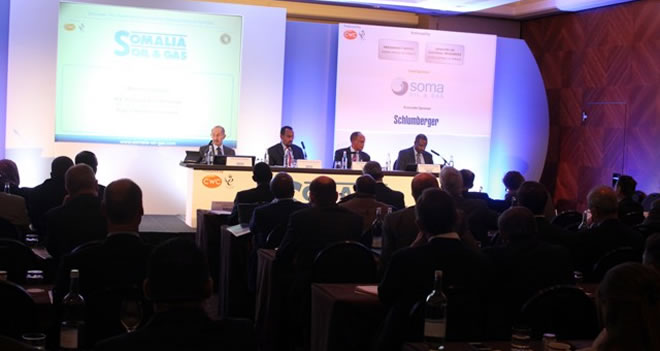
by Hassan Ali Hussein
Sunday, October 13, 2013
On October
07, 2013, Somalia Oil & Gas Summit 2013 sponsored by Soma Oil & gas and
Schlumberger was held in London. The Ministers
of National Resources and Finance of Federal Government of Somalia gave the
opening speech. Assorted articles
about Somalia’s oil and gas potential were presented and discussed. More than half
of the speakers were Somali professionals who have been in the geology field for
more than 3 decades.
This highly
organized and important summit provided the highest levels of
networking among the 100’s of delegates
from international oil companies, industry leaders, experts and investors. This
is a new era of
opportunities in the Somali oil and gas industry, due
to its geographic location, Somalia should look for markets and investors from
the East. Countries such as Malaysia, Japan, India and China will be eager to
gain access to Somalia’s oil and gas if its reserves are deemed to be viable.
History of Hydrocarbon Exploration in Somalia
The first well was drilled in Somalia in 1945 by
Sinclair. During 1950s and -1960s, no
substantial exploration activities were conducted as International Oil
companies were busy producing the already explored oil and gas regions of the Middle
East.
During 1980s there was
an “oil and gas exploration rush” to
Somalia, driven by the country’s huge oil and gas potential. All eight
major oil companies had concessions in Somalia and most of the onshore and
offshore seismic were conducted. Late
1980, oil companies ceased their exploration and declared force majeure due to civil war.
From 1991
to 2010, there has been a standstill to all exploration activities due to continued
civil unrest.
In 2011, Genel energy
signed two
production sharing agreements with Somaliland authority. In 2012, Africa Oil
and its partner Range Resources started
initial drilling in the Shabeel-1 well after they signed an exploration program
with Puntland authority.5
In
2013, a new era has started for Somali Oil and gas sector as the Federal Government
initiated new policy and regulations framework in the management of natural resources of
Somalia.
In a nutshell, since 1950s only less than 70 wells were drilled onshore
and 6 wells offshore. So far most of the drilled wells have no
prospect of extracting-commercial oil. This indicates that Somalia is still under-explored country compared to the
other East of African countries. Somalia needs an extensive geological and
geophysical exploration. Federal Government of Somali had contacted the major
international oil & gas companies who currently hold concessions in Somalia
since the 1980s to re-start their operations in Somalia since the
security
situation continued to improve.
The Offshore seismic option agreement
with SOMA Oil and Gas Company
Recently
huge gas fields discovered offshores of Mozambique and Tanzania have sparked a
flurry of exploration activity across Africa. These east African countries
awarded exploration licenses to some large oil companies such as Shell,
Anadarko and Eni.
Despite
two decades in which the potential for the development of the petroleum exploration
in Somalia has been impossible due to the civil war. Some oil companies are aggressive risk-takers
who want to start and get hold of their share before the large oil or gas field
come to play since Somalia has longest coast on Africa with more than 3000 km
long and has the majority of the Indian Ocean margin lies within Somalia.
A new U K -based oil company
called “Soma Oil & Gas company” has signed
a contract with the Somali Federal governments. Under the terms of the agreement, Soma Oil &
Gas will perform seismic surveying offshore (from Kismayo to Hobyo) and in
certain limited onshore areas. The Company will prepare an evaluation of
Somalia’s petroleum potential by gathering and reprocessing previous seismic
data using modern techniques. New modern data analysis procedures and
interpretation techniques should be applied and final seismic data will be
retained in data room.
Somali
Petroleum Law
The Somali Petroleum Law was enacted in
2008 by the previous Transitional Federal Government. Some regulations are not stringent enough and are open
to different interpretations by Federal government, regional authority as
well as oil companies. For example, one article states that any Oil and gas agreement should be signed by
both Federal and regional governments. What does this mean? What about if
one of the entities reject the agreement? Is the agreement still valid? What
about if each regional authority invite oil companies and enter into an agreement?
When the law does not separate clearly the federal authority and
local government, a legal battle might erupt under the rally cries of
“federalism”, “regionalism” or “constitutional rights”.
In nutshell, The Somali petroleum laws needs to be revised
and harmonized in the
hydrocarbon sector, including legal, technical and commercial aspects.
Conclusion
Somalia has become a hotbed of
exploration after oil discoveries in Kenya, Uganda and giant gas fields in
Tanzania and Mozambique. However, Somalia has yet to conduct extensive
geological and geophysical surveys as these surveys will aid significantly in
the structural mapping of undersea and prospective hydrocarbon basins.
If a hydrocarbon is discovered
offshore Somalia, will a “resource curse”
occur? Or will it improve the security situation and bring enhanced and
accelerated development? Or will it bring conflict and further military
activity, as seen in the raging conflict between Sudan and South Sudan? Or will oil bring greater collaboration between
federal and local governments?
Hassan Ali Hussein, PhD
Senior Trainer-ITD
Saudi Aramco- Dhahran, Eastern Province, Saudi Arabia
E-mail: [email protected]